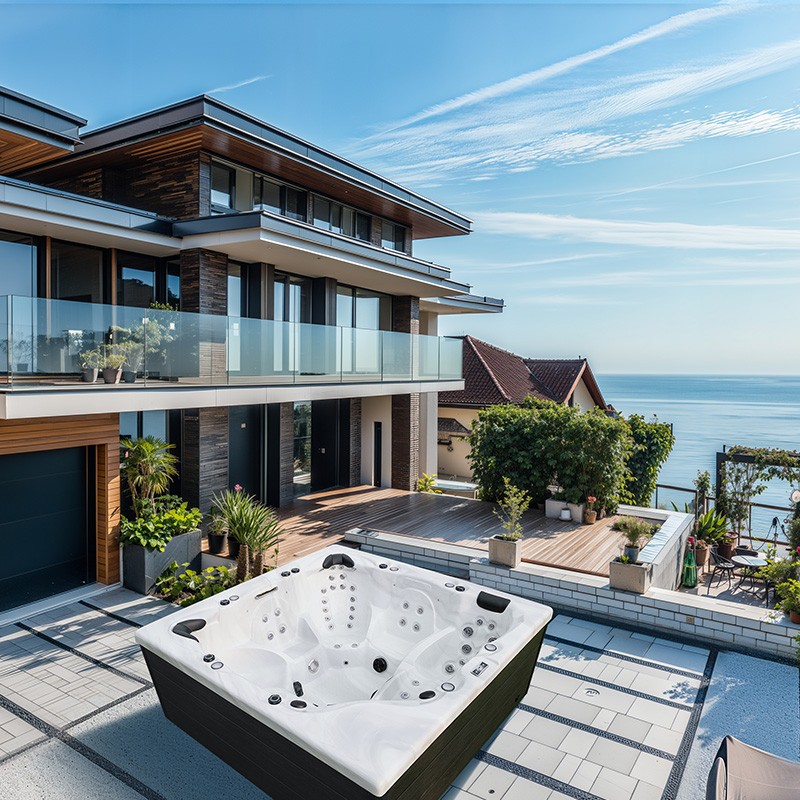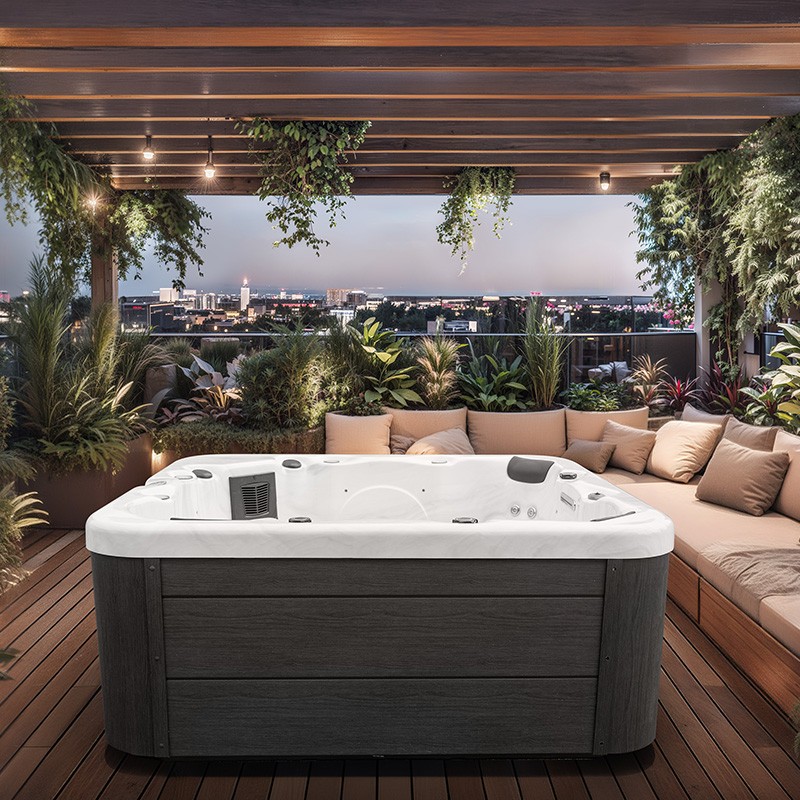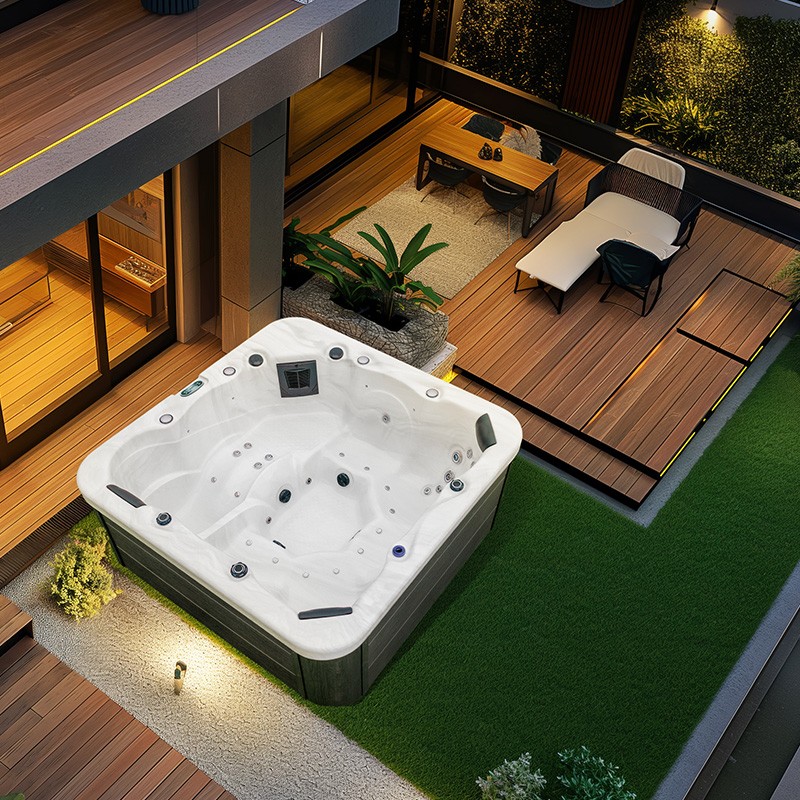
Can I use pool shock in an outdoor spa hot tub?
2025-08-08 15:30While enjoying the relaxation and comfort of an outdoor spa hot tub, water quality maintenance is also an important part that every spa hot tub user cannot ignore. The maintenance of spa hot tub water quality is directly related to the health and safety of users. As a common chemical product in pool water quality maintenance, many people will consider whether pool shock can be used to clean and disinfect spa hot tubs.
However, is this practice safe and effective? Under different water quality requirements and bathtub structures, can pool shock be used in spa hot tubs? This not only involves water quality cleaning, but also the long-term maintenance, service life and user safety of the bathtub.
This article will explore the correlation between pool shock and outdoor spa hot tub water quality maintenance in depth, helping users understand their differences, precautions when using, and the best water quality management methods.
What is pool shock?
Pool shock, usually a strong chemical disinfectant, is mainly used to clean and maintain swimming pool water quality. After long-term use, swimming pool water is susceptible to bacteria, algae, grease and other pollutants. Pool shock agents use their strong oxidizing properties to quickly decompose organic matter in the water, achieving the effects of cleaning, disinfection and removing turbidity. The ingredients of pool shock agents usually include the following:
· Chloride: Chlorine is one of the main ingredients of pool shock agents and has a strong bactericidal and disinfecting effect. Chloride can quickly remove bacteria and viruses in the water and keep the water clean.
· Peroxide: Hydrogen peroxide (H₂O₂) and other peroxides are also commonly found in pool shock agents. They have strong oxidizing properties and can decompose organic pollutants in the water.
· Active oxygen: Some pool shock agents use active oxygen ingredients to clean water quality. These ingredients remove impurities and pollution sources in the water through oxidation.
The use of pool shock agents is usually required to be used in the early morning or evening, and should be carried out when the pool is not in use, so that it has enough time to react and ensure the cleanliness and safety of the water quality.
Spa hot tubs and swimming pools: Differences in water quality requirements
Before discussing whether pool shock agents can be used in outdoor spa hot tubs, we need to understand the main differences in water quality requirements between spa hot tubs and swimming pools:
·Difference in water volume: The water volume of a swimming pool is usually much larger than that of an outdoor spa hot tub. The volume of water that needs to be treated in a swimming pool is large and the concentration of pollutants is low, so pool shock agents can act quickly. However, the water volume of a spa hot tub is small, the water body is more closed, and it is easy to produce higher chemical concentrations, so the water quality is more easily affected and requires more meticulous management.
·Difference in water temperature: The water temperature of a spa hot tub is usually higher, often maintained between 37℃ and 40℃, while the water temperature of a swimming pool is usually maintained between 24℃ and 28℃. Under high temperatures, some pool shock agents may react chemically or decompose and lose their due effect.
·Difference in frequency of use: Swimming pools are usually designed for multiple people, and the water quality will experience more contact and pollution, so regular shock treatment is required. Outdoor spa hot tubs are more often used by one person or a small area, and the water quality pollution is usually less, so its water quality maintenance cycle is longer and the need for shock treatment is relatively less.
·Water quality stability: Due to the high water temperature and relatively closed water body of spa hot tub, it is easy to breed bacteria and algae, especially when it is not used for a long time, the water quality may deteriorate rapidly. The water quality of swimming pools is more likely to be stable for a long time through conventional filtration systems and water circulation, while spa hot tubs often rely on external cleaners to maintain water quality.
Can I use pool shock in outdoor spa hot tubs?
Although pool shock can effectively remove pollutants in the water and keep the water clean in swimming pools, it is not necessarily suitable for spa hot tubs. The following points can explain why the two are not suitable for mixing:
1. Pool shock may damage spa hot tub equipment
The chlorides and peroxides in pool shock have strong chemical activity. These ingredients may cause corrosion and damage to spa hot tub pipes, nozzles, heating systems and other equipment at high temperatures. Especially for equipment that is used for a long time, excessive chemical reactions may accelerate the aging and damage of the equipment. The filters, pumps and nozzles of spa hot tubs are very sensitive to excessive chemicals. Some chemical components in pool shock may cause clogging of the filtration system or damage to the nozzles.
2. The water quality adjustment effect is not long-lasting
Although the pool shock agent can quickly clean the water quality in the swimming pool, its effect is usually temporary. Since the water body of the outdoor spa hot tub is small, the water quality is easily polluted and changed by the outside world. Therefore, the use of pool shock agents alone cannot effectively maintain the long-term stability of the spa hot tub water quality. The spa hot tub requires more meticulous and continuous water quality maintenance, rather than a one-time strong shock.
3. It may cause water quality imbalance
The strong oxidizing components and chlorides contained in the pool shock agent may cause the pH value of the spa hot tub water to change, resulting in unstable water quality. Excessive chlorine content will make the water produce a pungent odor and even affect the health of the skin and eyes. Long-term use of this chemical agent may cause the water quality to be in an unbalanced state for a long time, affecting the user's comfort experience.
4. Impact on the skin and respiratory tract
The chlorine component often contained in the pool shock agent will release strong chlorine gas when used in the outdoor spa hot tub, which may irritate the skin and respiratory tract. The water temperature in the spa hot tub is high, and the chlorine gas evaporates quickly, increasing the risk of users being exposed to chlorine gas. For users with sensitive skin, using this shock agent may cause dryness, allergies, or even irritation, especially in the case of long-term immersion, which may cause skin damage.
What are the water quality maintenance methods for spa hot tubs?
Since pool shock agents are not suitable for outdoor spa hot tubs, how should we effectively manage the water quality of spa hot tubs? Here are some recommended water quality maintenance methods:
1. Change the water regularly
The water quality of outdoor spa hot tubs is affected by many factors, including oil, sweat, bacteria, etc., so regular water changes are the most basic way to keep the water clean. It is recommended to change the water every 3 to 6 months to ensure the cleanliness of the water.
2. Use special spa hot tub cleaners
There are special cleaners and water quality maintenance agents for spa hot tubs on the market. These products are specially formulated to clean the water quality without damaging the equipment and maintain the pH balance of the water body. Using these products can ensure the long-term stability of water quality.
3. Keep the filtration system clean
Outdoor spa hot tubs are usually equipped with a filtration system, which can help remove impurities and pollutants from the water. Regular cleaning and replacement of filters are important steps to maintain water quality. In addition, it is also necessary to regularly check whether the filtration system is working properly to ensure that it is effectively cleaning the water.
4. Use ozone or UV disinfection
Ozone and UV disinfection systems are another common way to maintain the water quality of outdoor spa hot tubs. These disinfection methods can effectively remove bacteria and viruses from the water and do not rely on chemicals, so they have less impact on health. UV and ozone disinfection systems are usually installed in the water circulation system of spa hot tubs to continuously maintain water quality.
Do you offer discounts for seasonal promotions or special events?
Yes, we run regular promotional sales and seasonal discounts, especially for wholesale buyers and long-term partners. Subscribe to our newsletter or contact our sales team to learn about upcoming factory promotions and limited-time offers. Our company focuses on high-volume supply at affordable prices, helping you maximize profits during holiday or high-demand seasons.




